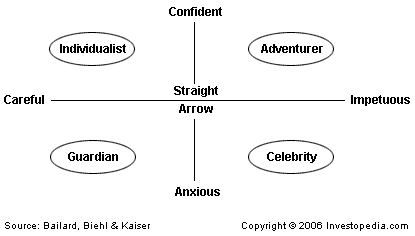Once you know what works in the market, you can come up with simple rules that work for you. For example, Warren Buffett is one of the most successful investors ever. His simple investment style is summed up in this well-known quote: "If I cannot understand it, I will not invest in it." It has served him well. While he missed the tech upturn, he avoided the subsequent devastating downturn of the high-tech bubble of 2000.
3. Know YourselfNobody knows you and your situation better than you do. Therefore, you may be the most qualified person to do your own investing - all you need is a bit of help. Identify the personality traits that can assist you or prevent you from investing successfully, and manage them accordingly.
A very useful behavioral model that helps investors to understand themselves was developed by Bailard, Biehl and Kaiser.
The model classifies investors according to two personality characteristics: method of action (careful or impetuous) and level of confidence (confident or anxious). Based on these personality traits, the BB&K model divides investors into five groups:
- Individualist - careful and confident, often takes a "do-it-yourself" approach
- Adventurer - volatile, entrepreneurial and strong-willed
- Celebrity - follower of the latest investment fads
- Guardian - highly risk averse, wealth preserver
- Straight Arrow - shares the characteristics of all of the above equally
Not surprisingly, the best investment results tend to be realized by an individualist, or someone who exhibits analytical behavior and confidence, and has a good eye for value. However, if you determine that your personality traits resemble those of an adventurer, you can still achieve investment success if you adjust your strategy accordingly. In other words, regardless of which group you fit into, you should manage your core assets in a systematic and disciplined way.
4. Know Your Friends and Enemies Beware of false friends who only pretend to be on your side, such as certain unscrupulous investment professionals whose interests may conflict with yours. You must also remember that, as an investor, you are competing with large financial institutions that have more resources, including greater and faster access to information.
Bear in mind that you are potentially your own worst enemy. Depending on your personality, strategy and particular circumstances, you may be sabotaging your own success. A guardian would be going against his or her personality type if he or she were to follow the latest market craze and seek short-term profits. Because you are risk averse and a wealth preserver, you would be affected far more by large losses that can result from high-risk, high-return investments. Be honest with yourself, and indentify and modify factors that are preventing you from investing successfully or are moving you away from your comfort zone.
5. Find the Right PathYour level of knowledge, personality and resources should determine the path that you choose. Generally, investors adopt one of the following strategies:
Don't put all of your eggs in one basket. In other words, diversify. Put all of your eggs in one basket, but watch your basket carefully. Combine both of these strategies by making tactical bets on a core passive portfolio.
Most successful investors start with low-risk diversified portfolios and gradually learn by doing. As investors gain greater knowledge over time, they become better suited to taking a more active stance in their portfolios (i.e. tactical bets).
6. Be Disciplined
Sticking with the optimal long-term strategy may not be the most exciting investing choice. However, your chances of success should increase if you stay the course without letting your emotions, or "false friends," get the upper hand.
7. Be Willing to Learn
The market is hard to predict, but one thing is certain: it will be volatile. Learning to be a successful investor is a gradual process and the investment journey is typically a long one. At times, the market will prove you wrong. Acknowledge that and learn from your mistakes. When you succeed, celebrate.
The Bottom Line
What you achieve as an investor will depend on your goals, but sticking to these seven simple steps will help keep you on the right path. Bon voyage! 


















